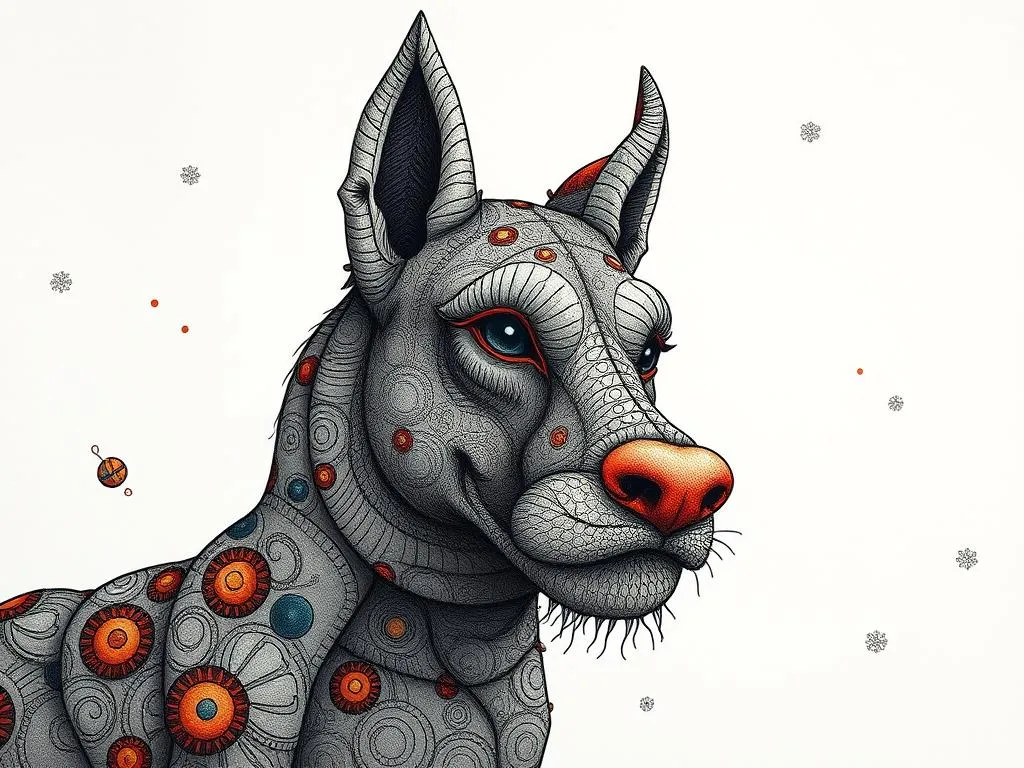
Introduction
Dogs have been beloved companions for centuries, with various breeds offering a unique array of characteristics and traits. Among these, the Mastidoodle is a crossbreed that has gained considerable popularity in recent years. This delightful mix of the Mastiff and Poodle combines the best traits of both parent breeds, making it an attractive option for many potential dog owners. Understanding dog breeds, especially a unique crossbreed like the Mastidoodle, is crucial for anyone considering welcoming a new furry friend into their home.
Understanding the Mastidoodle
Definition and Origins
The Mastidoodle is a designer dog breed resulting from the crossing of the Mastiff and the Poodle. This hybrid aims to blend the intelligence and hypoallergenic qualities of the Poodle with the strength and protective nature of the Mastiff. As a relatively new breed, the Mastidoodle emerged to cater to dog lovers seeking a family-friendly companion with both affectionate and guarding traits.
Historically, the Mastiff has roots tracing back to ancient civilizations, serving as guardians and war dogs. The Poodle, known for its intelligence and versatility, originally served as a water retriever in Europe. Combining these two breeds results in a dog that is not only loving but also protective and highly trainable.
Physical Characteristics
Mastidoodles typically exhibit a range of physical traits influenced by their parent breeds. They can vary significantly in size, but most adults weigh between 70 to 130 pounds and stand about 24 to 30 inches tall at the shoulder.
These dogs often have a curly or wavy coat, which can be hypoallergenic, thanks to the Poodle lineage. Common coat colors include black, fawn, apricot, and brindle, with many variations and patterns possible. Their physicality often reflects the robustness of the Mastiff, along with the elegant features of the Poodle.
Temperament and Behavior
One of the most appealing aspects of the Mastidoodle is its temperament. These dogs are known for their friendly and gentle nature. They tend to be affectionate, making them excellent family pets. The Mastidoodle inherits the loyalty of the Mastiff and the intelligence of the Poodle, resulting in a well-rounded companion.
In contrast to their parent breeds, Mastidoodles generally exhibit a more laid-back demeanor than purebred Mastiffs, making them easier to manage in a family setting. They are social creatures who thrive on companionship, making them suitable for households with children and other pets.
Health and Care
Common Health Issues
Like any breed, Mastidoodles are prone to certain health issues. Some of the common concerns include hip dysplasia, elbow dysplasia, and certain heart conditions. While these issues can be serious, many can be managed or mitigated through proper care and regular veterinary check-ups.
Preventive measures, including a balanced diet, regular exercise, and maintaining a healthy weight, can significantly reduce the risk of developing these conditions. Additionally, potential owners should inquire about the health history of the parent breeds to better understand any genetic predispositions.
Grooming Requirements
Grooming is an essential aspect of caring for a Mastidoodle. Their coats require regular brushing to prevent matting and maintain a healthy shine. Depending on the coat type, grooming may be needed every four to six weeks to keep it in good condition.
Regular grooming not only enhances their appearance but also allows for the early detection of skin issues and parasites. Bathing should be done as needed, but over-bathing can strip natural oils from their coat, so moderation is key.
Exercise Needs
Mastidoodles are active dogs that require regular exercise to maintain their physical and mental well-being. Daily walks, playtime in the yard, and engaging activities like fetch or agility training are excellent ways to keep them stimulated.
They thrive in environments where they can run and play, so providing them with ample opportunities for exercise is crucial. Mental stimulation is equally important; puzzle toys and interactive games can help keep their minds sharp and prevent boredom.
Training and Socialization
Training Basics
Training a Mastidoodle can be a rewarding experience, given their intelligence and eagerness to please. Utilizing positive reinforcement techniques, such as treats and praise, is highly effective with this breed. Consistency is key; establishing a routine helps them understand expectations.
Basic obedience training should begin at an early age. Commands like sit, stay, and come are essential for a well-behaved companion. Socialization is equally important; exposing your Mastidoodle to various environments, people, and other animals from a young age will help them develop into a well-rounded adult dog.
Socialization Strategies
Socializing a Mastidoodle involves introducing them to different experiences and settings. Puppy classes are a great way to meet other dogs and learn essential social skills. Additionally, regular outings to parks or community events can expose them to various sights, sounds, and people.
The benefits of early socialization are manifold. It helps prevent behavioral issues, reduces anxiety in new situations, and fosters a friendly demeanor. A well-socialized Mastidoodle is more likely to adapt well to different environments and interact positively with strangers and other pets.
Living with a Mastidoodle
Ideal Living Conditions
Mastidoodles can adapt to various living environments, making them versatile companions. While they do well in both urban and rural settings, they thrive in homes where they have access to outdoor space to play and explore.
Urban dwellers should ensure that their Mastidoodle gets sufficient exercise through daily walks and trips to dog parks. In contrast, those living in rural areas can provide ample space for their dog to roam and play, which is beneficial for their physical health.
Family Compatibility
When considering a Mastidoodle, it’s essential to assess family dynamics. These dogs are generally good with children and often form strong bonds with family members. Their protective nature makes them excellent watchdogs, while their playful disposition ensures they enjoy family activities.
However, early socialization and training are crucial, particularly in households with young children or smaller pets. Teaching children how to interact respectfully with the dog will foster a harmonious environment.
Choosing a Mastidoodle
Reputable Breeders vs. Adoption
When deciding to bring a Mastidoodle into your home, it’s vital to choose the right source. Reputable breeders focus on health, temperament, and socialization, ensuring that their puppies are well-prepared for family life.
Alternatively, adopting a Mastidoodle from a shelter can be a rewarding experience. Many dogs are in need of loving homes, and adopting can provide a second chance for a dog in need. Regardless of the source, ensure that you research and ask questions about the dog’s background and health.
What to Look For
When selecting a Mastidoodle, consider several key factors. First, assess the dog’s health history, including any vaccinations and medical records. Look for signs of a well-socialized dog, such as a friendly attitude towards people and other pets.
Questions to ask breeders or shelters include inquiries about the dog’s temperament, training history, and any known health issues. A responsible breeder or shelter staff will be transparent and willing to provide you with all the necessary information.
Cost of Owning a Mastidoodle
Initial Purchase Price
The initial purchase price for a Mastidoodle can vary significantly based on factors like location, breeder reputation, and lineage. On average, you can expect to pay anywhere from $1,500 to $3,000 for a well-bred puppy.
Prices may be higher for dogs with a particularly desirable pedigree or those with championship lineage. Always consider the long-term costs associated with dog ownership, beyond just the initial price tag.
Ongoing Expenses
Owning a Mastidoodle comes with ongoing expenses that should be factored into your budget. Regular costs include high-quality dog food, grooming supplies, vet visits, vaccinations, and preventive care.
On average, you can expect to spend between $500 to $1,000 annually on these essentials. Additionally, consider other expenses such as training classes, pet insurance, and unexpected medical costs. Being financially prepared will help ensure that you can provide a loving and stable home for your new companion.
Conclusion
The Mastidoodle is a unique and lovable breed that brings together the best traits of its parent breeds, the Mastiff and the Poodle. With their friendly temperament, adaptability, and intelligence, these dogs make wonderful family pets for suitable households. Understanding their needs, from health care to training and socialization, is key to ensuring a happy and fulfilling relationship.
As you contemplate adding a Mastidoodle to your family, take the time to consider your lifestyle, living conditions, and the responsibilities that come with dog ownership. With the right preparation and commitment, a Mastidoodle can bring immense joy and companionship into your life.









